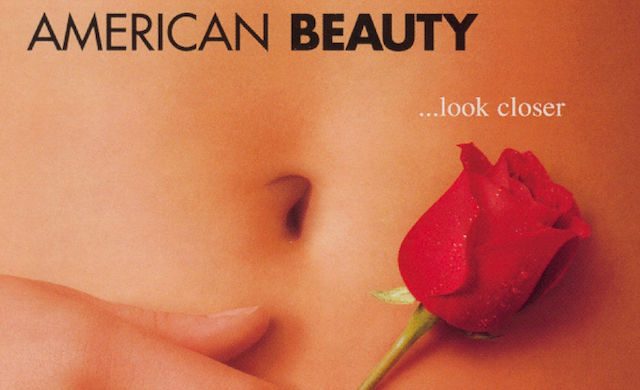
Like almost every film that wins the Oscar for Best Picture, “American Beauty” was highly acclaimed, and then suffered a backlash for being too highly acclaimed. (The nerve of some movies, being praised enthusiastically!) Though the vast majority of contemporary reviews were positive — 88% at Rotten Tomatoes, with a Metacritic score of 86 out of 100 — once all the shouting was over a sense of buyer’s remorse began to creep in.
In 2005, Premiere magazine put “American Beauty” at the top of its list of the “20 most overrated movies of all time.” (The feature is no longer online, but the list is archived here.) The New York Times’ A.O. Scott famously hates it, and mentions his disdain every chance he gets. A simple Google search for “American Beauty” overrated brings up numerous likeminded sentiments.
Now, the condescending term “overrated” makes me feel stabby: what you’re saying is that the amount YOU like the movie is the correct amount, and anyone who liked it more than you did has made an error. But I understand the sentiment. “American Beauty” won a lot of awards, yet plenty of viewers don’t think it’s that great. That’s fair. And since its director, Sam Mendes, has a certain James Bond movie coming out this week, it seemed like a good time to take another look at his first film, 13 years later.
What I said then:
“This is an extraordinary film, managing to be both dreary and optimistic simultaneously…. As with all the great daydreaming milquetoast protagonists, from Willy Loman to Walter Mitty, there is some amount of hope by the end – even if that hope seems shattered by the final scene and its implications…. Not one of these characters is good, nor do any of their real selves match their facades, but several are still sympathetic and even lovable…. ‘American Beauty’ is compelling to watch, full of black humor, evocative imagery and wrenching sadness. It creates more of a mood than an actual theme or message, though even that mood is difficult to describe. You have to see it to understand that even by seeing it, you may not understand it. All you know is, you’ve just watched a movie you couldn’t take your eyes off of for a second.” Grade: A [Here’s the whole review.]
Allow me to point out something about that review: it’s not very good. I was still pretty new to the whole film critic biz, and my recollection is that “American Beauty” stumped me. I knew I loved it, but I had a hard time explaining what I loved about it, or why — which, you know, is only the whole point of a movie review.
The re-viewing:
Thirteen years later, it’s hard to watch “American Beauty” without thinking about the parodies, homages, and rip-offs it inspired. That business with the floating plastic bag (which is a little precious), the rose petals, and Thomas Newman’s distinctive plink-plink musical score feel particularly dated now — not because they’re typical of movies from 1999, but because they’ve been reproduced and referenced so often since then. Screenwriter Alan Ball’s next project, HBO’s wonderful “Six Feet Under,” was cut from the same cloth, adding to the familiarity.
I think what made it difficult to put my finger on why I liked the movie is also what turned some viewers off altogether. Its tone is constantly shifting from dark comedy to suburban drama to broad satire to middle-class tragedy. Most of the characters are two-dimensional types: the dissatisfied mid-life-crisis husband who buys a sports car, the career-driven wife who has an affair, the homophobic Marine with a Southern accent, the teenage Lolita, and so on. This lack of depth is fine (preferable, even) when the movie is operating as an almost farcical satire, a slick mockery of the fakeness of modern American life. But I can see how it would be problematic for viewers who find it off-putting not to be able to sympathize with anyone, especially as the story progresses and we’re drawn more deeply into the serious crises facing these shallow people.
Sometimes the shift in tone happens abruptly, leaving us uncertain how we’re supposed to react. The scene where Frank Fitts (Chris Cooper) observes his son (Wes Bentley) selling drugs to Lester Burnham (Kevin Spacey) but misinterprets it as a gay sex liaison is straight out of a sitcom or an Austin Powers movie. It’s clearly meant to be funny. But it’s immediately followed by Fitts’ violent and shocking retaliation against his son, permanently fracturing their relationship and steering the film toward its tragic conclusion. As viewers, we’re not comfortable with such important plot developments arising out of such a goofy scenario. We expect funny misunderstandings to have light consequences, and for heavy dramatics to have serious roots. Going against that feels wrong, like the filmmakers miscalculated somewhere. A person’s reaction to the movie might hinge on whether this strikes them as a mistake, or as an intentional subversion of expectations, perhaps a comment on how the most important moments of our lives can have their origins in triviality. Basically, it either works for you or it doesn’t.
Newman’s score plays a greater role in the film’s success than I realized. Like the movie itself, the music is ambiguous, without much melody, often upbeat even when it seems like it shouldn’t be. It isn’t unpleasant, but it doesn’t follow a traditional pattern, either. Is the jauntiness meant as mockery of these poor fools’ tragic lives, a sarcastic underscore to a dark comedy? Or is it a clue that the movie isn’t tragic at all — that finding moments of beauty and clarity, as some of the characters do, fulfills them and makes the story an optimistic one? Either interpretation is justified. That multifaceted, it-works-on-different-levels element is one more thing to admire about the movie.
Do I still love this movie?
As it turns out, I do. Whether you view it as a scathing satire or a piercing drama — or some combination of the two — it’s effective at grabbing hold and not letting go. It’s compelling in an unusual way, adhering to a formula while continually refreshing itself with vivid performances and creative flourishes. Hopeful or pessimistic, bleak or beautiful, we have no reason to disown this movie. Embrace it! Even that stupid plastic bag. Grade: A-
— Film.com




